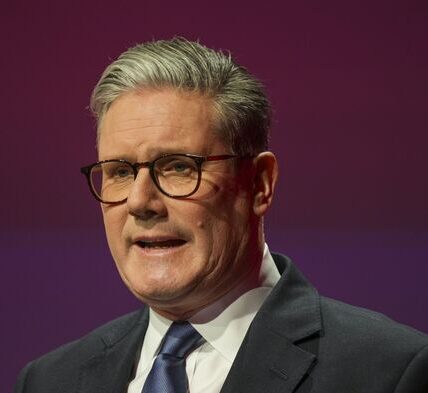The Chancellor is desperately looking for a way to carry out a u-turn on winter fuel payment means testing

Chancellor Rachel Reeves is trying to reverse her winter fuel payment cuts (Image: Getty)
Chancellor Rachel Reeves could hit thousands of grieving families with a new death tax as she scrambles to find a way of ending Labour’s winter fuel payment disaster. Relatives of elderly people who have passed away could be faced with demands to repay allowances of up to £300.
Ms Reeves has pledged that more pensioners will receive the winter fuel allowance this year after she axed payments of for more than nine million pensioners by introducing means-testing. But the Government is struggling to find a way of keeping the promise. The preferred option would be to increase the income threshold for means-testing, so that more pensioners qualify for the money. At the moment, anyone with an income over £11,500 is usually deemed to be too wealthy to get the payment. However ageing computer systems in Whitehall are not capable of introducing a different threshold.
Ministers are instead considering simply giving the allowance to every pensioner again, and then reclaiming the money from the more wealthy through the tax system.
But it could take six months for demands to repay the money to be sent out. And there are fears that thousands of pensioners would die during this period – leaving their grieving relatives to pick up the bill.
The Guardian reports one source said: “We should never have scrapped the winter fuel payment in the first place, but the whole process of reinstating it has been completely chaotic. The optics of us demanding the money back from grieving families are dire.”
Ms Reeves yesterday told reporters that “more people will get winter fuel payment this winter”, adding that further details will be announced “as soon as we possibly can”.
She said: “People should be in no doubt that the means test will increase and more people will get winter fuel payment this winter.”
Asked whether she would tell the public if she planned to fund her commitments by raising taxes or cutting spending on other departments, the Chancellor said: “As we have been clear, on winter fuel we will set out how we will fund that at the next fiscal event.
“We will set out how everything will be paid for at the budget in the autumn but it’s important that everything that we do is funded, because that’s how people know that we can afford it.”
Eamonn Donaghy, Chief Executive of the National Federation of Occupational Pensioners and a spokesperson for campaigners Later Life Ambitions said, “Rachel Reeves has listened to the voice of reason but she is not off the hook yet.
“We cautiously welcome the announcement and hope that the new threshold will be reflective of pensioners’ realities – many, sadly, have limited financial reserves and need a helping hand to keep warm.
“We also remain concerned however by the Government’s attitude to pensioners, many of whom endured a cold winter followed by months of uncertainty as the Cabinet continued to ignore calls to re-evaluate its stance.
“Pensioners cannot and must not be taken for granted. We’ll wait to see the details of the reinstated winter fuel payment before determining how well the government has learned that lesson.”
Downing Street did not deny that details of how the winter fuel payment may be restored to more pensioners could come at next week’s spending review on June 11.
The Prime Minister’s official spokesman told reporters: “As the Prime Minister has said, we will only take decisions that are affordable. He has made clear that we want to expand the number of pensioners who are eligible for the winter fuel payment.
“We will set out the details of that in due course. You have got the Chancellor’s words from this morning. You have got the PM’s words from earlier in the week that we want to set out that detail as soon as possible.”
Downing Street previously suggested a fiscal event, like the autumn budget, was the likely avenue which would be used to expand eligibility for the winter fuel payment.
Asked if there had been a change in thinking on this, the spokesman again pointed to the Prime Minister and Chancellor’s language on making the change as soon as possible.
“You can probably take their words on that,” he said.
Meanwhile, pensions minister Torsten Bell told MPs that, while more pensioners will be eligible, there is no prospect of returning to universal winter fuel payments.
Speaking to the Work and Pensions Committee, Mr Bell said: “Directly on your question of is there any prospect of a universal winter fuel payment, the answer is no, the principle I think most people, 95% of people, agree, that it’s not a good idea that we have a system paying a few hundreds of pounds to millionaires, and so we’re not going to be continuing with that.
“But we will be looking at making more pensioners eligible.”
Prime Minister Sir Keir Starmer recently signalled a partial U-turn over the Government’s decision to strip winter fuel payments from millions of pensioners.
The Prime Minister said “as the economy improves”, he wanted to look at widening eligibility for the payments worth up to £300.
But officials have been unable to say how many more pensioners would be eligible.
The decision to means-test the previously universal payment was one of the first announcements by Chancellor Rachel Reeves after Labour’s landslide election victory last year, and it has been widely blamed for the party’s collapse in support.
The Government has insisted the policy was necessary to help stabilise the public finances, allowing the improvements in the economic picture which Sir Keir said could result in the partial reversal of the measure.
On July 29 2024, the Government announced that from winter 2024, winter fuel payments would be dependent on receiving another means-tested benefit, as part of measures to fill a “black hole” in the public finances.
This meant the number of pensioners receiving the payment was reduced by around 10 million, from 11.4 million to 1.5 million.
Pension credit is the primary benefit by which pensioners can receive the winter fuel payment.
The credit tops up incomes for poorer pensioners and acts as a gateway to additional support, including the winter fuel payment.
Asked what groups who are currently missing out on winter fuel payments he would like to include again, if possible, Mr Bell told the committee: “We are committed to the principle that there should be some means-testing and that those on the highest incomes shouldn’t be receiving winter fuel payments in the context of wider decisions we have to make – and fairness is an important part of that.
“You can then take from that that my priority is those who are on lower incomes but have missed out.”
He told the MPs: “I’m not getting into anything about the operation of that but just, you know, I think all of us will have heard from people on lower incomes who didn’t receive winter fuel payment this year and I understand the points they’ve raised. And so we’d like to see wider eligibility.”
Put to him that a universal winter fuel payment would be “100% guaranteed” to reach those who needed it, Mr Bell told the committee: “You have to wait for us to set out the policy and we will engage directly with the point you are raising.”
Asked what work had been done with HM Revenue and Customs (HMRC) to assess the practicality of recouping payments from higher rate taxpayers, Mr Bell said: “We’re looking at all of the policy options for how this eligibility can be extended, and when I’ve got more to tell you about that, I absolutely will.”
Commenting on the hearing, Tom Selby, director of public policy at AJ Bell, said the Government “now faces a dilemma in determining exactly who should be eligible”.
He suggested that one option could be to award the payment to everyone receiving a state pension, clawing the money back from higher income households, potentially through their tax returns.
Mr Selby said: “This might look something like the process for clawing back child benefit for working households, although that has caused mass confusion among taxpayers bamboozled by the complexity of the rules.”


